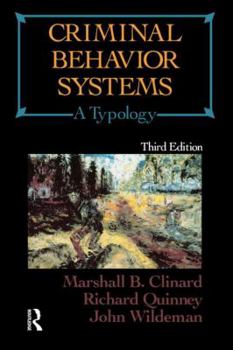Criminal Behavior Systems
Select Format
Select Condition 
Book Overview
An important classic, especially useful for courses in criminal behavior and personality, this text begins with a discussion of the construction of types of crime and then formulates and utilizes a... This description may be from another edition of this product.
Format:Paperback
Language:English
ISBN:0870841807
ISBN13:9780870841804
Release Date:March 1994
Publisher:Routledge
Length:280 Pages
Weight:2.30 lbs.
Dimensions:0.6" x 6.0" x 9.0"
Customer Reviews
1 rating
A Standard Work In Criminology
Published by Thriftbooks.com User , 19 years ago
Clinard and Quinny examine crime and develop a typology for it that is a little at variance with popular ideas, but they defend their typology well, and it makes sense. They classify crime in 9 categories, among them: conventional crime; occasional property crime; violent personal crime; organized crime; public order crime; corporate crime; professional crime; occupational crime; and political crime. In each category they examine the same features pertinent to all criminal behavior. They examine the criminal career of the offender in each category, public and legal attitudes toward these individuals, support systems they may have, attitudes of the offenders, and other features. Their discussion of each category of crime is thorough and enlightening. A reading of this work will take the reader far in understanding the huge problem of crime, establishing intelligent definitions, and even making him or her aware of crime of great consequence that law enforcement has no legal tools to deal with and that is often actually opaque to both law enforcement, to the judicial system, and to the public. As far as I know, this work is a classic in criminology, familiar to all criminologists, and is often a text for university level courses in criminology.





